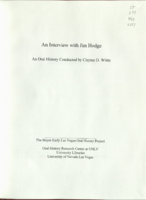Search the Special Collections and Archives Portal
Search Results

Transcript of interview with Jim Hodge by Claytee White, April 13, 2009
Date
Archival Collection
Description
Jim Hodge describes an active and success filled life in this narrative. Born and raised in the South, Jim enlisted in the Navy at the young age of 17, just as World War II was winding down. His primary job was that of a cook. He became smitten with the life of an entertainer after participating in a play and headed for Hollywood in 1952. It was there that he auditioned for Donn Arden, who organized and directed Las Vegas shows. Though he didn't get the part, he did get hired to be a singer for a show featuring Betty Grable. Thus his career was launched and would span the heyday of Las Vegas entertainment from the 1950s to the 1970s. Jim talks about the people, shows and places that touched his life. He also offers thoughts about the changes in the Vegas entertainment scene as well as shares his relationship with his church over the past 40 years.
Text

Transcript of interview with Dennis Ortwein by Claytee White, May 6, 2009
Date
Archival Collection
Description
Dennis Ortwein arrived in Las Vegas in 1956. He shares many details about growing up in Montana, his parents and siblings, his education, and the moment in time when he was offered an opportunity to work in Las Vegas. He also lays out the path his singing career took, starting with school plays, duets with his sister, and high school quartets. Once in Las Vegas, Dennis taught for a while, served as principal, and was involved in creating programs that helped integrate schools. He also talks about his church choir work, entertainment in early Las Vegas, above-ground testing at the Nevada Test Site, and anti-nuclear protests. Dennis served as lab school and student teaching coordinator in Nigeria. He offers several anecdotes and stories about the time he and his family spent there. After retiring early (age 53), Dennis acted as consultant to the Esmeralda County school board, executive director for the National Conference of Christians and Jews, and wrote a book. He is currently enjoying his singing career by appearing at conventions, in musicals, and at weddings and memorials.
Text

Transcript of interview with Toshiyuki "George" Goto by Christina Oda, February 26, 1979
Date
Archival Collection
Description
On February 26, 1979, Christina Oda interviewed Toshiyuki “George” Goto (born 1922 in Huntington Beach, California) about his life in Nevada. Goto first talks about his move to Nevada in 1951 before talking about his family, church activities, politics, and recreational activities. He then discusses the building, economic, and environmental changes in Las Vegas. Goto later talks in depth about his profession in landscaping, including the work he completed for some of the hotels and resorts built on the Las Vegas Strip. The latter part of the interview includes discussion about Goto’s Japanese ancestry and his perceptions as a minority when first moving to and living in Las Vegas. The interview’s conclusion covers the topics of social activities and Goto’s organization of a local chapter of the Japanese American Citizens League.
Text

Transcript of interview with Ethel S. Hatch by P. Kohlman, November 24, 1975
Date
Archival Collection
Description
On November 24, 1975, collector P. Kohlman interviewed housewife, Ethel S. Hatch (born April 11th, 1914 in Valentine, Texas) in her home in Las Vegas, Nevada. This interview covers the history of Las Vegas from 1939 to 1975. Mrs. Hatch also talks about ranching in Nevada, Rex Bell, development on the Strip, the first hotels, and early local shopping culture. She refers to Block Sixteen as Block Thirteen when discussing the Red Light District. The interview concludes with discussion surrounding tree-lined streets, the Helldorado Club, and Fremont Street.
Text

Transcript of interview with Judy Laliberte by LaVaun Hendrix, February 27, 1979
Date
Archival Collection
Description
On February 27, 1979, collector Judy Laliberte interviewed local school teacher LaVaun Hendrix in her home in Las Vegas, Nevada. The two discuss how Hendrix originally came to Nevada, her occupational history, and differences between the school system in Las Vegas and other states that she’s lived in. Hendrix explains how a changing school system has affected her job as a teacher and her students. She goes on to talk about the above-ground atomic tests, Helldorado, changes to the desert, and Nevada during World War II. The interview concludes with Hendrix describing her travels through Nevada.
Text

Transcript of interview with Marie Jordan by Danny Budak, March 20, 1978
Date
Archival Collection
Description
On March 20, 1978, collector Danny Budak interviewed the University of Nevada Las Vegas (UNLV) bookstore buyer, Marie Jordan (born June 26th, 1940 in Arizona) in the UNLV library. This interview offers Marie Jordan’s personal perspective of life in Nevada, being a local resident for twenty years. Marie also discusses family life and changes that she has witnessed in the Valley.
Text

Transcript of interview with Henry Clay Davis by Wendy Christian, March 5, 1978
Date
Archival Collection
Description
On March 5, 1978, collector Wendy Christian interviewed truck driver Henry Clay Davis (born April 19, 1900 in Irondale, Virginia) in his home in Las Vegas, Nevada. This interview covers Henry Clay Davis’s personal life history as a resident of Las Vegas, which includes hunting and fishing. He also discusses employment, the railroad, old hotels, the Davis Dam, and Lake Mead. Additionally, he offers a detailed description of the Helldorado.
Text

Transcript of interview with Jack Cornell by Richard Fesler, February 18, 1979
Date
Archival Collection
Description
On February 18, 1979, Richard Fesler interviewed Jack W. Cornell (born 1918 in Manhattan, Nevada) about his experiences living in Nevada. The two first discuss historical buildings, including the Nye County Courthouse, and Cornell describes his family background and the different locations at which his ancestors lived. Cornell then talks about his experiences as an airplane mechanic for the Army Air Corps during World War II and the different countries he would visit during that time. The two also discuss the effects of the Depression, Cornell’s work in automotive body repair, and his recreational activities. Cornell also describes an experience in which he assisted an air escort for President Roosevelt, and he also describes when he witnessed one of the atomic tests. The interview concludes with Cornell’s thoughts on how the rural area in Manhattan has changed over time.
Text

Paul Velez oral history interview: transcript
Date
Archival Collection
Description
Oral history interview with Paul Velez conducted by Barbara Tabach on February 22, 2018 for the Remembering 1 October Oral History Project. In this interview, Paul Velez, a University of Nevada, Las Vegas (UNLV) campus officer, discusses his experience at the Thomas & Mack Center during the night of the October 1, 2017 mass shooting in Las Vegas, Nevada. He shares his goal of creating a safe atmosphere for the survivors and providing them with all of their needs, including helping separated survivors find their loved ones and friends. Velez also describes his move to Las Vegas in 2008 and his time with the New York City police force, talking about his experience as a first responder at Ground Zero during the 9/11 attacks. He discusses the effect these attacks have had on general and campus security measures and on him as an individual.
Text

Transcript of interview with Dorothy George by Claytee White, October 13, 2003
Date
Archival Collection
Description
After serving as a nurse in World War II in Hawaii, Okinawa and Japan, Dorothy returned home to Chippewa Falls, Wisconsin. She experienced a particularly bad winter and she set out for California but stopped in Las Vegas to visit the family of her traveling companion, a girlfriend from her home town. The girlfriend returned to Wisconsin and George applied for a nursing license and got it within three days. She never left. Dorothy met her husband while working the night shift at Clark County Hospital. He would come in regularly to assist his patients in the births of their babies. Their occupations and their service in World War II drew them together in a marriage that has lasted over fifty years. From 1949 to this interview in 2003, Dorothy George has seen Las Vegas grow from a town that she loved to a metropolitan area that is no longer as friendly. She reminisces about the Heldorado parades, family picnics at Mount Charleston, watching the cloud formed by the atomic bomb tests, raising six successful children, leading a Girl Scout Troop, and working in organizations to improve the social and civic life of Las Vegas.
Text
